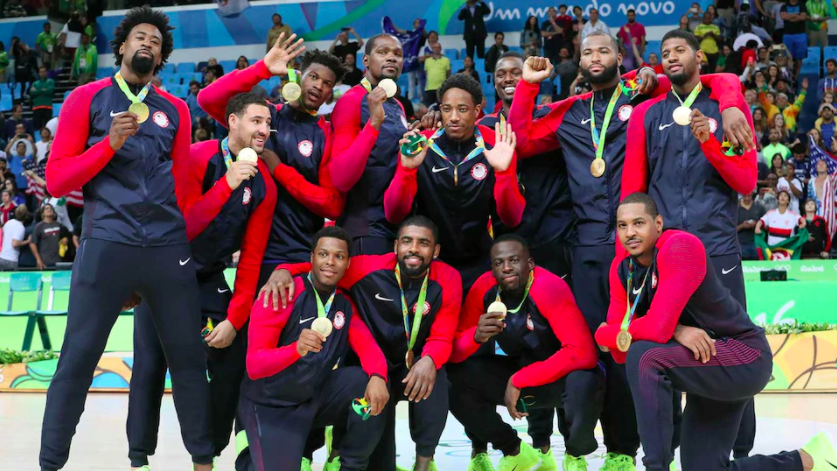{originally written August 23, 2016}
Going into the gold medal game against Serbia, I knew Team USA would win, but I wasn’t sure by how much. The last time Team USA played Serbia in the preliminary round, they barely won by three points. Analysts focused their attention on the lack of chemistry, lackadaisical defense, and low shooting percentage by Team USA in their victory over Spain in the semifinal game. They even hinted at the idea of Team USA having a hard time beating Serbia in the rematch. If I wasn’t such a good listener, I wouldn’t have been able to pick up on the hint of sarcasm in their voices.
The game against Spain was decent. It reminded me of the 2008 gold medal game with the same type of intensity and rough play from Pau Gasol. At one point during the third quarter, the Spanish team got within three points, but that was the closest margin despite the two-point differential in the starting minutes. The Spanish had chemistry on the floor with smooth pick-and-rolls, wide-open looks from the arc, and aggressive defense, which kept them competitive. In the final three minutes of the fourth quarter, Spain went on a 10-4 run to close the gap to six points. They outscored Team USA by three points in the second and fourth quarter, but it didn’t matter. Team USA turned it on when they had to and slowed the pace when they felt like it. Despite what most might think, they were in control of that game.
Pau Gasol put up 23 points and pulled down eight rebounds for Spain. Team USA’s Klay Thompson pulled out his Super Soaker and drenched the net for 22 points while DeAndre Jordan collected 16 rebounds by just standing there.
At the end of the game, Thompson voiced exactly what I was thinking when he indirectly pointed the finger at the defense a couple times during a post-game interview. The tone of his voice changed when he said “defense,” as if the word was in italics on the script he was reading. Of course, he wasn’t reading a script. He was just a little unhappy by the defensive performance of Team USA. As a fan, I was a little unsatisfied as well. On the other hand, I did enjoy watching a few moments of clarity between Thompson and Jordan—Thompson slashing down the lane, forcing the defense to collapse on him, and giving Jordan enough room to spring above the box and catch the oop. It was perfect.
Honestly, I was expecting to see more of that style of play during the gold medal game—more catch-up defense, more chasing the ball around, leaving guys wide-open, and more close calls on the scoreboard. Instead, I was shocked to see a different Team USA, one that was fluid, comfortable, and poised. They played as if they had been together on the same team for a couple seasons in the league. A Dream Team resurrected.
At one point, after a series of smooth passes swinging around the arc for an easy shot in the corner by Thompson, Team USA looked like they finally found their groove. It was a beautiful thing watching passes from Carmelo Anthony to DeAndre Jordan, Kyrie Irving to Klay Thompson, and Draymond Green to Paul George. Then it was Kevin “Easy Money Sniper” Durant all day. He finished with 30 points. Team USA had Serbia by 40 points at one point, almost 50 at another, and, with glimmers of the Dream Team, defended the throne of the gold medal game by a confident 30 points.
Serbia looked good, no doubt. They were big, tough, and organized, but that was expected. Surprisingly, they only had one NBA player, Nikola Jokić, a 21-year-old center for the Denver Nuggets with no experience of the pressure of the NBA Finals or a game seven. So, no, he didn’t understand the turn-up by Team USA or how to stop it, which made him just another basketball player in the league. The olympics might have been as close as he experienced to actually feeling the pressure of the finals or game seven while he’s on the Nuggets, but he still has time.
Don’t forget that Vlade Divac, Peja Stojakovic, and Vladimir Radmanovic all represented Serbia in the NBA. Or should I say, they represented the NBA in the Olympics. I want to believe that those guys set the precedent for basketball in Serbia. In fact, the Serbian Team played in the same manner as their predecessors, as if it were doctrine—rough in the paint, great shots in the open floor, and lots of contact.
The Serbian style of basketball helped them keep it close during the first half, but it didn’t last as they couldn’t get past Team USA’s re-energized defense. Team USA was playing like it was game seven. They were contesting shots, making blocks at the rim, and swiping the ball loose when it was brought down. That’s the thing about these players on Team USA; they shift gears in game sevens. They excel under pressure. Just as Jordan said after the win over Spain “It’s game seven. […] We know what to do.” They were playing the gold medal game like it was supposed to be played. Together.
Team USA, 2016, found solace in the pressure of this game-seven-esque, gold medal game. They did it just as Bird, Jordan, Magic, and the eight other players enshrined in the Naismith NBA Hall of Fame did during every game in the Summer Olympics of 1992. They defended the throne and brought gold medals back home.
Let’s name this team the “Supreme Team II.”

